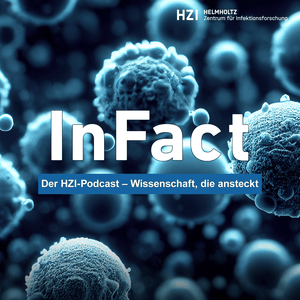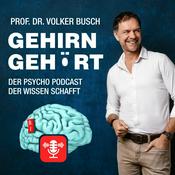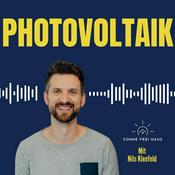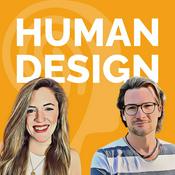InFact - Der HZI-Podcast. Wissenschaft, die ansteckt.
HZI - Helmholtz-Zentrum für Infektionsforschung GmbH

Neueste Episode
36 Episoden
- At first glance, biology and computer science seem like opposites. In reality, however, computer science is something like a highly organized manager for modern biology: wherever enormous amounts of data are generated from research, progress is hardly possible without digital methods.
Bioinformatician Prof. Andreas Keller therefore relies on artificial intelligence. He heads the Clinical Bioinformatics research group at the Helmholtz Institute for Pharmaceutical Research Saarland, or HIPS for short – an institute founded in 2009 by the Helmholtz Centre for Infection Research and Saarland University.
In this episode of InFact, host Julia Demann talks to him about how AI can help us understand how beneficial and harmful bacteria communicate with each other in our bodies, how to predict when infections will cause long-term effects, and how this can be used to develop new drugs against dangerous pathogens. - Biologie und Informatik wirken auf den ersten Blick wie Gegensätze. In Wahrheit aber ist die Informatik für die moderne Biologie so etwas wie eine hochorganisierte Managerin: Überall dort, wo enorme Datenmengen aus der Forschung entstehen, wird ohne digitale Methoden kaum noch ein Fortschritt möglich.
Bioinformatiker Prof. Andreas Keller setzt deshalb auf künstliche Intelligenz. Er leitet die Forschungsgruppe Klinische Bioinformatik am Helmholtz-Institut für Pharmazeutische Forschung Saarland, kurz HIPS – einem Institut, das 2009 vom Helmholtz-Zentrum für Infektionsforschung und der Universität des Saarlandes gegründet wurde.
In dieser Folge von InFact spricht Host Julia Demann mit ihm darüber, wie KI helfen kann zu verstehen, wie nützliche und schädliche Bakterien in unserem Körper miteinander kommunizieren, wie sich vorhersagen lässt, wann Infektionen Spätfolgen auslösen – und wie man damit neue Medikamente gegen gefährliche Erreger entwickeln kann. - In dieser Folge von „InFact“ spricht Host Julia Demann mit Jun.-Prof. Jens Hör über ein faszinierendes Werkzeug im Kampf gegen resistente Keime: Phagen – Viren, die gezielt Bakterien angreifen, für uns Menschen jedoch ungefährlich sind.
Phagen wirken wie winzige, spezialisierte Jäger: Sie docken an Bakterien an, schleusen ihr Erbgut ein und programmieren die Zellen so um, dass diese nur noch Phagenerbgut produzieren – bis sie schließlich platzen und neue Phagen freisetzen. In der Theorie eine vielversprechende Alternative zu Antibiotika, in der Praxis jedoch eine große Herausforderung. Denn auch Bakterien entwickeln eigene Abwehrstrategien.
Am Helmholtz-Institut für RNA-basierte Infektionsforschung (HIRI) in Würzburg untersucht Jens Hör mit seiner Forschungsgruppe, welche Rolle vor allem RNA-Phagen spielen, wie sie sich von DNA-Phagen unterscheiden – und was noch geschehen muss, damit Phagen-Therapien in Deutschland flächendeckend eingesetzt werden können. - In this episode of “InFact”, host Julia Demann talks to Jun. Prof. Jens Hör about a fascinating tool in the fight against resistant germs: Phages - viruses that specifically attack bacteria but are harmless to humans.
Phages act like tiny, specialized hunters: They attach themselves to bacteria, inject their genetic material, and reprogram the cells so that they only produce phage genetic material – until they eventually burst and release new phages. In theory, this is a promising alternative to antibiotics, but in practice it poses a major challenge. This is because bacteria also develop their own defense strategies.
At the Helmholtz Institute for RNA-based Infection Research (HIRI) in Würzburg, Jens Hör and his research group are investigating the role played by RNA phages in particular, how they differ from DNA phages – and what still needs to be done before phage therapies can be used nationwide in Germany. - In dieser Folge von „InFact“ spricht Host Julia Demann mit Prof. Dr. Fabian Leendertz darüber, wie Krankheiten entstehen, die vom Tier auf den Menschen überspringen – sogenannte Zoonosen – und warum der Schutz der Umwelt dabei eine zentrale Rolle spielt.
Leendertz erklärt, wie Lebensraumverlust, Klimawandel und Globalisierung neue Übertragungswege für Krankheitserreger schaffen, und warum Mensch, Tier und Natur nur gemeinsam gedacht werden können. Am Helmholtz-Institut für One Health (HIOH) erforschen er und sein Team, wie sich Infektionsrisiken frühzeitig erkennen lassen – mit Daten aus afrikanischen Dschungelregionen ebenso wie aus Mecklenburg-Vorpommern.
Im Mittelpunkt steht der One-Health-Ansatz: ein Konzept, das Gesundheitsforschung, Ökologie und Prävention miteinander vernetzt, um besser auf zukünftige Pandemien vorbereitet zu sein.
Weitere Bildung Podcasts
Trending Bildung Podcasts
Über InFact - Der HZI-Podcast. Wissenschaft, die ansteckt.
Wie lösen Bakterien und Viren Krankheiten aus? Wie wehrt sich unser Immunsystem dagegen? Und was müssen Wirkstoffe können, um gefährliche Infektionen zu bekämpfen? Am Helmholtz-Zentrum für Infektionsforschung – kurz HZI - wird nach Antworten auf diese Fragen gesucht. Wie diese Forschung funktioniert, wie die Ergebnisse in der Medizin genutzt werden und wer die Menschen sind, die hier forschen. Das hört ihr hier: Bei InFact - dem Podcast des Helmholtz-Zentrums für Infektionsforschung.
Podcast-WebsiteHöre InFact - Der HZI-Podcast. Wissenschaft, die ansteckt., Wissen mit Johnny und viele andere Podcasts aus aller Welt mit der radio.de-App

Hol dir die kostenlose radio.de App
- Sender und Podcasts favorisieren
- Streamen via Wifi oder Bluetooth
- Unterstützt Carplay & Android Auto
- viele weitere App Funktionen
Hol dir die kostenlose radio.de App
- Sender und Podcasts favorisieren
- Streamen via Wifi oder Bluetooth
- Unterstützt Carplay & Android Auto
- viele weitere App Funktionen


InFact - Der HZI-Podcast. Wissenschaft, die ansteckt.
Code scannen,
App laden,
loshören.
App laden,
loshören.








































